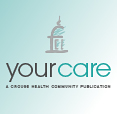Flu Advisory
Flu seasons are unpredictable in a number of ways, including when they begin, how severe they are, how long they last and which viruses will spread.
The flu is a serious, contagious disease that affects thousands of people of all ages every year. For detailed information about the flu and its current activity, visit the Centers for Disease Control and Prevention and the New York State Department of Health.
General Prevention
The flu is very contagious. Follow these simple precautions to prevent the spread of the flu: There are a few simple steps that can be taken to help prevent the spread of flu.
- Get vaccinated.
- Wash your hands frequently.
- Cover your mouth and nose with a tissue when you cough or sneeze.
- If you have flu or flu-like symptoms (fever, body aches, stuffy nose or cold) stay home from work or school until 24 hours after the fever subsides.
Seasonal Flu
The seasonal flu is a contagious respiratory illness that can cause mild to severe illness, and at times lead to death.
According to the Centers for Disease Control and Prevention (CDC), each year in the United States, on average:
- 5% to 20% of the population gets the flu
- More than 200,000 people are hospitalized from flu-related complications; and
- About 36,000 people die from flu-related causes
Those at a higher risk for complications include the elderly, young children, pregnant women and people with specific conditions such as asthma, diabetes or heart disease.
Symptoms:
- Fever (often high)
- Headache
- Extreme tiredness
- Dry cough
- Sore throat
- Runny or stuffy nose
- Muscle aches
- Nausea
Prevention: Get vaccinated! The seasonal flu shot is an easy way to stay healthy. The vaccination takes effect about two weeks after it is received and lasts for about a year. You should get vaccinated starting in September, as the peak period of the disease is during November and December. Check with your local pharmacy for the distribution of the flu shot.
If you answer YES to any of the following, you are encouraged to get vaccinated:
- Are you 24 years of age or younger?
- Do you work in healthcare or emergency medical services?
- Are you a household contact or caregiver for children younger than 6 months of age?
- For ages 25 to 64, do you have a chronic or immunosuppressive medical condition?
- Are you pregnant?
To prevent against the flu, it is important to:
- Wash your hands to help keep the germs at bay.
- Stay at home if you have a fever of flu-like symptoms. If you have a fever, stay home for 24 hours after the fever has subsided without the aid of fever medication. If someone you live with has contracted H1N1, you can still go to work but remember to monitor your own health.
School Emergency Plans
- Know your child’s school emergency plan.
- Know how the school will communicate with you during an emergency.
- Ask if the school maintains adequate supplies of food, water and other basics.
- Find out if the school is prepared to shelter in place and what their evacuation plan is.
- Monitor local media for announcements regarding school closings and follow directions of local emergency officials.


